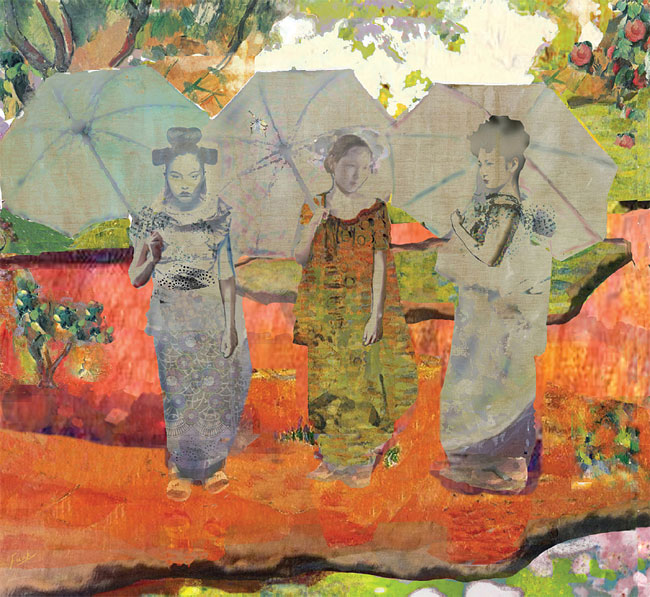Issue 9 - Language

The Lotus Eaters II by Mia Funk
In a country where the language spoken is not my first, I am always living in a series of translations, and mistranslations.When I first moved to France, my tongue’s recalcitrant stuttering and the flush that bloomed from my neck when I spoke meant I opened my mouth only when necessary. This, I am sure, influenced the way that my then-boyfriend saw me: when he described me as small and wispy, he was imposing the sound of silence on his vision of my frame, which neither I nor anyone I am close to has ever considered “wispy.” Two years later, my second time living in France – still the same height, still the same weight, but with a tongue perhaps more nimble and adept at shaping my thoughts – he told me, over the polite formality of our long-empty coffee cups, that I was “moins maigre qu’avant.” Because I was speaking confidently and competently, striding brazenly through the mistakes I was surely making, he no longer saw me as a fragile, languageless creature.
In Virginia Woolf ’s Orlando, the title character lives among gypsies whose language he does not speak. He struggles not only to find ways to express himself, but also with the desire to communicate in the first place. “It is a curious fact,” he says, “that though human beings have such imperfect means of communication, that they can only say ‘good to eat’ when they mean ‘beautiful’ and the other way about, they will yet endure ridicule and misunderstanding rather than keep any experience to themselves.” Woolf recognizes the way we sacrifice our egos in the hope of being understood.
And when we are alone? When there is no one to listen to, or be heard by? Think of the tragic ending of “Into the Wild,” the film based on John Krakauer’s book about the life of Christopher McCandless. After months of rebellious solitude, McCandless eats a fatally poisonous plant and, in his last gasps before expiring, he scrawls in his encyclopaedia of forest flora and fauna “happiness is only real when shared.” If I rolled my eyes it was only so my neighbour wouldn’t see that they were leaking.
The myth of true understanding is glorified in encyclopaedias and manuals. In Rivka Galchen’s essay on the Diagnostics Statistics Manual (the notorious DSM), published
in The Paris Magazine, she writes that “categories give us new and illuminating ways of being wrong. Categories, in their shortcomings, remind us that we’re always
wrong, at least a little bit.” Taxonomies are focusing lenses, but can’t help falling short of what they attempt to define. A world where everything was its definition would be a nightmare somewhere between Egyptian mythology and a short story by Borges (for whom “to think is to generalize”).
Language was the key to immortality for Renaissance poets and their subjects. Take Shakespeare’s sonnet number 55: “Not marble, nor the gilded monuments/ Of princes, shall outlive this powerful rhyme/….You live in this.” Poet Christian Bok is pushing this idea to its limits with a project that will render the metaphor of immortality concrete: he is writing a poem which will be encoded in the DNA of a bacterium that he will create as he writes it. The bacterium will be resilient to illness and accident and, he projects, will be the only thing left when the world reaches its end. Each letter will be paired in such a way that every word will make sense when translated into a protein within the pattern Bok configures. In the beginning was the Word and at the end, all that’s left will be a poem. This issue of Her Royal Majesty explores the theme of language as one way that we understand
and share our reality.
Harriet Alida Lye, Editor in Chief